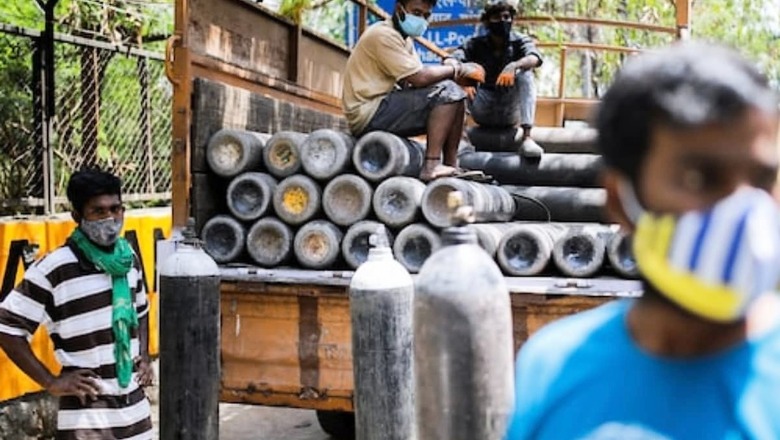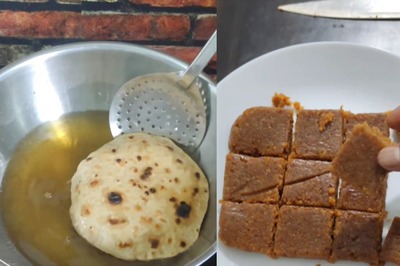
views
In the backdrop of a record surge in coronavirus cases, the health ministry on Friday said it has asked the states to treat the available oxygen as a critical commodity and undertake an oxygen-consumption audit at all hospitals, including private ones, amid a shortage of the life-saving gas in several parts of the country. The ministry also warned against the “misplaced bravery” reflecting in statements such as “corona is nothing”, “it is a scam”, “we have had enough of the coronavirus”, “I do not need a mask”, “let’s party”, “there is life beyond worrying over the coronavirus” and stressed on following COVID-appropriate behaviour and treatment guidelines, highlighting that “we may be tired but the virus is not”.
Seeking everyone’s support to manage the situation, Joint Secretary in the Union Health Ministry Lav Agarwal said a “misplaced fear” is also being observed among people and urged them not to stock oxygen cylinders or life-saving drugs at home. Addressing a press conference, he said from the start of the pandemic, the government had identified oxygen-supported beds as major clinical interventions.
“We have requested the states to treat the available oxygen as a critical commodity and also to ensure a rational use of oxygen,” Agarwal said. He said the states have been advised to prohibit an abnormal use of oxygen by monitoring the non-closure of the cylinder valve when it is not being used.
“It has been observed that oxygen cylinders are being given as part of home-based COVID care packages by some private hospitals,” Agarwal noted. He said it has also been reiterated that the states build COVID suspect wards for patients whose test results are yet to be out.
“If any patient, whose result is not there for any reason but who exhibits clinical symptoms of COVID-19, admit the patient to a COVID suspect ward and start his treatment,” Agarwal said. Listing out the steps taken by the Centre to augment the supply of oxygen, he said the National Pharmaceutical Pricing Authority (NPPA) has issued instructions for fixing the price of liquid medical oxygen.
Agarwal said 162 pressure swing adsorption (PSA) plants of 154-MT capacity each have been sanctioned across the country. Of these, 52 are already installed, 87 have been delivered and the work to commission these plants at the earliest is on. The PSA plants can enable hospitals for in-situ generation of oxygen.
Agarwal said the states have been allotted 8,593 MT of oxygen. The government procured 1,02,400 oxygen cylinders in April-May 2020 and distributed those among the states, he noted.
“An order for 1,27,000 oxygen cylinders was placed on April 21 and the deliveries are expected to start in a couple of days. These include 54,000 jumbo cylinders (‘D’ type) and 73,000 regular cylinders (‘B’ type). “Additionally, 551 PSA plants have been sanctioned to be implemented by the health ministry. These plants will be installed in different public health facilities,” he added.
Agarwal said oxygen is being imported and so far, an order for 200 MT of the life-saving gas has been placed with SSB Cryogenic, Singapore, another for 1,800 MT has been placed with Gulf Industrial Gases, Abu Dhabi and yet another for 1,500 MT is given to Ultra Pure Gases. Efforts are being made to increase the availability of oxygen tankers to over 2,000 (from the existing 1,224 tankers with 16,732 MT capacity) through the conversion of 50 per cent of the 600 nitrogen and argon tankers and import of 138 cryogenic tankers, he said.
AIIMS Director Dr Randeep Guleria said in the second wave of the pandemic, the rate of rise of the infection has been rapid, which has put an immense strain on the health infrastructure. “Also, the doubling of COVID-19 cases has been rapid. That should ease if the turnover time reduces,” he added.
Guleria observed that this time, the virus is spreading in tier-two and tier-three cities. “So it is important to train the doctors about treating this new disease,” he said and underlined the importance of avoiding misuse of drugs such as Remdesivir and Tocilizumab. “Systemic oral steroids are not indicated in case of mild disease and may be counter-productive, especially if started too early. One should consult doctors before starting it,” he said.
About the “misplaced fear”, Agarwal said, “We are seeing a misplaced fear that ‘I came in contact with a case, I am infected and will surely die’, ‘I need Remdesivir, just in case I get the infection’, ‘Let’s get an oxygen cylinder in advance at home’.” He underlined that fear and panic only aggravate and complicate the agony. “Let’s not get an oxygen cylinder in advance at home,” he said.
However, there are some alert and aware citizens also, who know that chances of contracting the infection can be minimised by wearing a mask and washing hands and believe in following the guidelines and consulting doctors, Agarwal said. He stressed that the citizens need to follow all the guidelines, take every precaution and follow COVID-appropriate behaviour.
“The virus has not gone into fatigue, even if we have. Laxity at any level will impact everyone in the society. We need the support of everyone to manage the situation,” Agarwal said.
Read all the Latest News, Breaking News and Coronavirus News here. Follow us on Facebook, Twitter and Telegram.

















Comments
0 comment